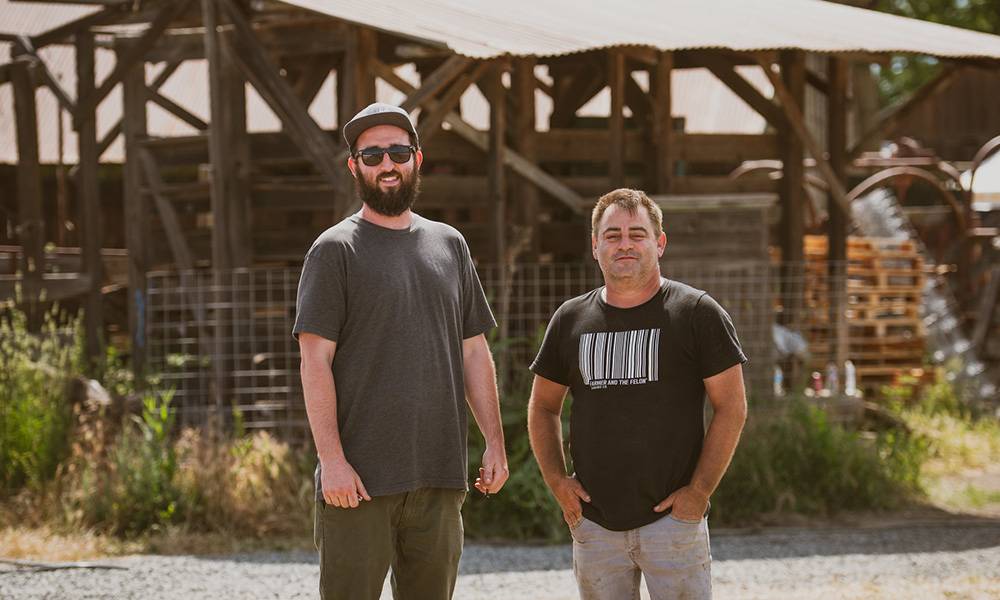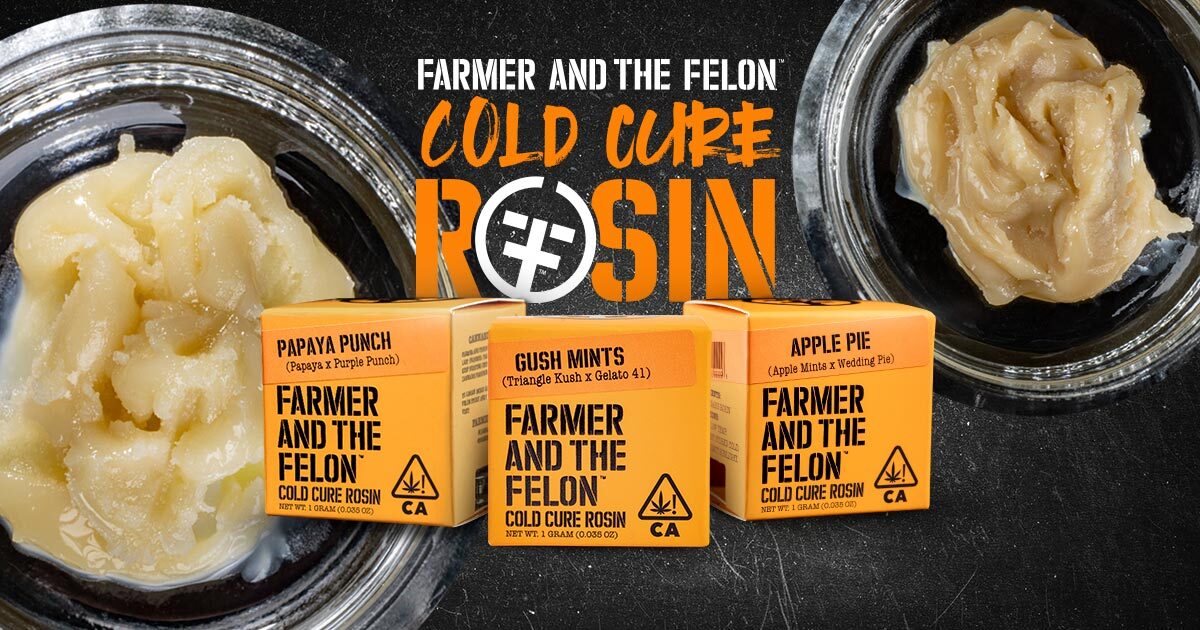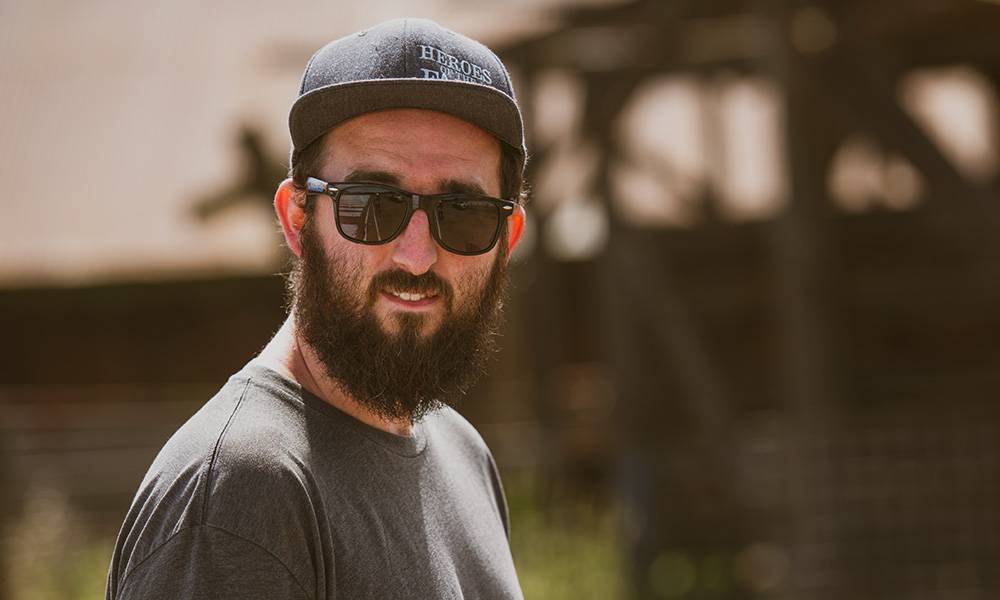For our inaugural edition of “Know Your Farmer,” we introduce Ned Fussell, co-founder of the Farmer and Felon brand along with Dennis Hunter. A longtime grower with a deep appreciation for cannabis, Fussell and Hunter now run California’s largest cannabis enterprises, including CannaCraft, while exploring new ventures, projects, and causes.
Driven by his love of cannabis, Ned Fussell moved from Massachusetts to Northern California in 2007 to pursue a lifelong interest in cultivation. Over the last ten years, Ned created large, sophisticated cultivation networks, with extensive experience in growth operations, site evaluation, farm mapping, irrigation design, lighting design, soil fertility analysis, feed assessment, and crop scheduling yielding frequent and healthy cannabis harvests year-round.
After meeting Dennis, the two growers joined forces to create CannaCraft in 2014, transforming the legal cannabis industry while building one of the largest and most diversified cannabis companies in California.

Tell us about your first experience farming cannabis?
NED: I was eighteen years old and growing on the Caribbean coast of Costa Rica, up in the mountains. I was selling cannabis ice cream as my side gig and started growing it after a while. I had a pretty good little scenario growing and living down there right by the coast. You’re so close to the equator, so the days have 12 hours of light and 12 hours of dark. 12-and-12—that's what triggers cannabis plants to go into their flowering cycle. Costa Rica is a great place for vegetative growth and cloning because high humidity makes for good conditions for rooting cuttings. Flowering gets trickier because you're dealing with mold and rain. Definitely, a complicated place to cultivate. Coming from Costa to California, I can't think of a better climate for the plants and farming cannabis. Going outside is always a reminder and a blessing of where I ended up and how easy it is to cultivate here.
Did you grow up farming or working with the land?
NED: No, I'm from the East Coast originally, from Massachusetts. My background was more on the sales side. But after I graduated high school I moved down to Costa Rica and realized there was an ability to farm so I tried it. The ability to produce the product I'd gotten so tight with was cool. I met some folks from Mendocino down in Costa Rica and they would bring me some of their organic seaweed and nutrients for my little garden. That's how I was able to get connected to California. They all brought me up to Redwood Valley when I was about 19 to help them with harvest. I also spoke Spanish from living in Costa Rica so I was able to connect with the people I was working alongside. Many of those people still work with me today. Eventually, I started farming in Mendocino.
What lessons did nature, and the cannabis plant, teach you?
NED: Even in the harshest of conditions, with the right care, cannabis plants find their way to grow. Being in the industry you need to have the same perspective. There's a lot of different opportunities to knock you down and you have to restart or rebuild.
Biggest mistakes you made early on?
NED: When I look at all my mistakes and everything I’ve learned, I realize it was worth it. I have that perspective. One time we were transporting clones in a large truck and the driver managed to peel the roof off on an overpass. We lost all of our plants, he was arrested...We should have gotten a truck that was 25 ft instead of 26!
Biggest challenges as a farmer?
NED: Plants are very easy to get along with once you realize what they're looking for. Managing people is more challenging. The plant side of it is pretty easy.
Most rewarding experience(s) as a farmer?
NED: As farmers you plant, and you grow. Just this year for the first time we're hitting our harvest cycle so everyone is excited. The fact that you can plant it and harvest it in three months is pretty rewarding. You get to see the fruit of your labor pretty quickly. And there's very little input, little power, you're just leveraging the California sun and climate. Being able to create opportunity is also rewarding. And so is the medicinal impact. I was growing cannabis before I realized this whole hidden side that is helping people therapeutically.
Is there such a thing as a "green thumb"? Why or why not?
NED: There's definitely a green thumb. It comes down to this attention to detail and the ability to turn on the more nurturing side of your brain. Women actually make the best farmers—you have to think about that and why.
What farming methods do you think produce the highest quality cannabis, or what methods do you stand behind?
NED: We have a very simple approach. Less is more. We plant directly into the ground, we amend with compost. We produce all our own seed so most plants are from seed. It's close to a lot of traditional agriculture. There's been a lot of years of trying to overcomplicate it. Cannabis is called weed for a reason. We're more focused on producing the highest grade, sungrown, and we're fortunate to be in California where we don't need anything else.
Of all the pests that affect Cannabis, which do you loathe the most?
NED: That's tough. Somewhere between the helicopters and the spider mites. Those black helicopters with their guns are pesty when they're buzzing over your garden. That's not as much of an issue anymore but for years they'd just be circling you, taking pictures, and visiting you again in a few days. You never knew if they were going to land or what was going to happen.
What strain (or class of strains) do you enjoy or have had the most success growing?
NED: We grow a lot of Cookie crosses, the Seed Junkie genetics, a lot of Gelatos and Lemon Kush mints. We're doing some Rebel Genetics—Double OG sours. There's the White Runts, Georgia Pie, Gary Payton. They're ones we've been breeding with for quite a while. When we grow clone varieties we like we use them for a few years. We're always looking for different traits, terpene profiles, potency. Being in California we're on the shoulders of giants in terms of the genetic foundation that's existed here for many years as the place that grows the best cannabis in the world. You have the best breeders and the most amazing varieties coming out of these hills, so just being able to test, try all those different things out, and working over the years with it and crossing it has been fruitful.
Who/what are you excited to see coming in the future?
NED: Rapid evolution of social consciousness. Everyone seems to be waking up at the same time. There's added interest in the therapeutic value of plants. Plant-based therapies are moving forward through decriminalization and legalization initiatives.
What have been the biggest challenges you've faced during the transition to a legal cannabis market?
NED: The IRS is a big challenge. Not being able to write anything off. You really have to love what you're doing. If you talk to anyone in the legal cannabis space, I can guarantee that they were all much better off financially prior to now. Most of them have not only not made anything during this transition but they've burned through their savings trying to keep the dream alive. Balancing growth and pressure to grow the business while keeping your north star.
Why did you want to give back with Farmer and the Felon?
NED: We feel very fortunate. Even though it's a challenging space and there are high seas to go through and high mountains to climb, we're lucky. There's a lot of people like me and Dennis who had that entrepreneurial spirit and worked hard who just drew the wrong straw and didn't make it. Yes, it takes skill and yes, you have to take risks. But to say that we're unique, no, there were people doing the same thing we were doing who got locked up and went to Federal Prison for doing exactly what we were doing. It's important and super crucial that companies like ours step up and do this and more. We have to give back in any way we can.
You've been considered a visionary by some. How do you keep the mind clear enough to be creative when you're driving a big ship at the same time?
NED: At the end of the day, try not to take things too seriously. The universe has a way of taking twists and turns on you. Once you learn to go with the flow things start manifesting in front of you. Put yourself in the right place around good, smart people, and they make you look like a visionary, that's how it works.

